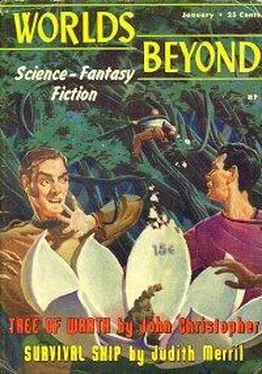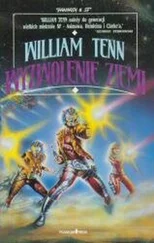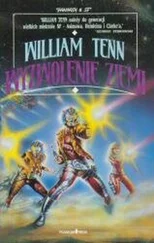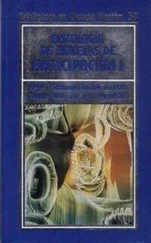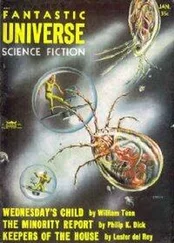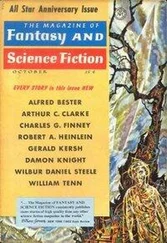William Tenn - Null-P
Здесь есть возможность читать онлайн «William Tenn - Null-P» весь текст электронной книги совершенно бесплатно (целиком полную версию без сокращений). В некоторых случаях можно слушать аудио, скачать через торрент в формате fb2 и присутствует краткое содержание. Год выпуска: 1951, Издательство: Hillman Periodicals, Inc., Жанр: Фантастика и фэнтези, на английском языке. Описание произведения, (предисловие) а так же отзывы посетителей доступны на портале библиотеки ЛибКат.
- Название:Null-P
- Автор:
- Издательство:Hillman Periodicals, Inc.
- Жанр:
- Год:1951
- ISBN:нет данных
- Рейтинг книги:3 / 5. Голосов: 1
-
Избранное:Добавить в избранное
- Отзывы:
-
Ваша оценка:
- 60
- 1
- 2
- 3
- 4
- 5
Null-P: краткое содержание, описание и аннотация
Предлагаем к чтению аннотацию, описание, краткое содержание или предисловие (зависит от того, что написал сам автор книги «Null-P»). Если вы не нашли необходимую информацию о книге — напишите в комментариях, мы постараемся отыскать её.
Null-P — читать онлайн бесплатно полную книгу (весь текст) целиком
Ниже представлен текст книги, разбитый по страницам. Система сохранения места последней прочитанной страницы, позволяет с удобством читать онлайн бесплатно книгу «Null-P», без необходимости каждый раз заново искать на чём Вы остановились. Поставьте закладку, и сможете в любой момент перейти на страницу, на которой закончили чтение.
Интервал:
Закладка:
At the inception of Abnego’s sixth term—the first in which his oldest son served with him as Vice-President—a group of Europeans reopened trade with the United States by arriving in a cargo ship assembled from the salvaged parts of three sunken destroyers and one capsized aircraft carrier.
Received everywhere with undemonstrative cordiality, they traveled the country, amazed at the placidity—the almost total absence of political and military excitement on the one hand, and the rapid technological retrogression on the other. One of the emissaries sufficiently mislaid his diplomatic caution to comment before he left:
“We came to America, to these cathedrals of industrialism, in the hope that we would find solutions to many vexing problems of applied science. These problems—the development of atomic power for factory use, the application of nuclear fission to such small arms as pistols and hand grenades—stand in the way of our postwar recovery. But you, in what remains of the United States of America, don’t even see what we, in what remains of Europe, consider so complex and pressing. Excuse me, but what you have here is a national trance!”
His American hosts were not offended: they received his expostulations with polite smiles and shrugs. The delegate returned to tell his countrymen that the Americans, always notorious for their madness, had finally specialized in cretinism.
But another delegate who had observed widely and asked many searching questions went back to his native Toulouse (French culture had once more coagulated in Provence) to define the philosophical foundations of the Abnegite Revolution.
In a book which was read by the world with enormous interest, Michel Gaston Fouffnique, sometime Professor of History at the Sorbonne, pointed out that while twentieth-century man had escaped from the narrow Greek formulations sufficiently to visualize a non-Aristotelian logic and a non-Euclidean geometry, he had not yet had the intellectual temerity to create a non-Platonic system of politics. Not until Abnego.
“Since the time of Socrates,” wrote Monsieur Fouffnique, “Man’s political viewpoints have been in thrall to the conception that the best should govern. How to determine that ‘best,’ the scale of values to be used in order that the ‘best’ and not mere undifferentiated ‘betters’ should rule—these have been the basic issues around which have raged the fires of political controversy for almost three millennia. Whether an aristocracy of birth or intellect should prevail is an argument over values; whether rulers should be determined by the will of a god as determined by the entrails of a hog, or selected by the whole people on the basis of a ballot tally—these are alternatives in method. But hitherto no political system has ventured away from the implicit and unexamined assumption first embodied in the philosopher-state of Plato’s Republic.
“Now, at last, America has turned and questioned the pragmatic validity of the axiom. The young democracy to the West, which introduced the concept of the Rights of Man to jurisprudence, now gives a feverish world the Doctrine of the Lowest Common Denominator in government. According to this doctrine as I have come to understand it through prolonged observation, it is not the worst who should govern—as many of my prejudiced fellow-delegates insist—but the mean: what might be termed the ‘unbest’ or the ‘non-elite.’ ”
Situated amid the still-radioactive rubbish of modern war, the people of Europe listened devoutly to readings from Fouffnique’s monograph. They were enthralled by the peaceful monotonies said to exist in the United States and bored by the academician’s reasons thereto: that a governing group who knew to begin with that they were “unbest” would be free of the myriad jealousies and conflicts arising from the need to prove individual superiority, and that such a group would tend to smooth any major quarrel very rapidly because of the dangerous opportunities created for imaginative and resourceful people by conditions of struggle and strain.
There were oligarchs here and bosses there; in one nation an ancient religious order still held sway, in another, calculating and brilliant men continued to lead the people. But the word was preached. Shamans appeared in the population, ordinary-looking folk who were called “abnegos.” Tyrants found it impossible to destroy these shamans, since they were not chosen for any special abilities but simply because they represented the median of a given group: the middle of any population grouping, it was found, lasts as long as the group itself. Therefore, through bloodshed and much time, the abnegos spread their philosophy and flourished.
Oliver Abnego, who became the first President of the World, was President Abnego VI of the United States of America. His son presided—as Vice-President—over a Senate composed mostly of his uncles and his cousins and his aunts. They and their numerous offspring lived in an economy which had deteriorated very, very slightly from the conditions experienced by the founder of their line.
As world president, Oliver Abnego approved only one measure—that granting preferential university scholarships to students whose grades were closest to their age-group median all over the planet. The President could hardly have been accused of originality and innovation unbecoming to his high office, however, since for some time now all reward systems—scholastic, athletic, and even industrial—had been adjusted to recognition of the most average achievement while castigating equally the highest and lowest scores.
When the usable oil gave out shortly afterwards, men turned with perfect calmness to coal. The last turbines were placed in museums while still in operating condition: the people they served felt their isolated and individual use of electricity was too ostentatious for good abnegism.
Outstanding cultural phenomena of this period were carefully rhymed and exactly metered poems addressed to the nondescript beauties and vague charms of a wife or old mother. Had not anthropology disappeared long ago, it would have become a matter of common knowledge that there was a startling tendency to uniformity everywhere in such qualities as bone structure, features and pigmentation, not to mention intelligence, musculature, and personality. Humanity was breeding rapidly and unconsciously in toward its center.
Nonetheless, just before the exhaustion of coal, there was a brief sputter of intellect among a group who established themselves on a site northwest of Cairo. These Nilotics, as they were known, consisted mostly of unreconstructed dissidents expelled by their communities, with a leavening of the mentally ill and the physically handicapped; they had at their peak an immense number of technical gadgets and yellowing books culled from crumbling museums and libraries the world over.
Intensely ignored by their fellowmen, the Nilotics carried on shrill and interminable debates while plowing their muddy fields just enough to keep alive. They concluded that they were the only surviving heirs of Homo sapiens, the bulk of the world’s population now being composed of what they termed Homo abnegus.
Man’s evolutionary success, they concluded, had been due chiefly to his lack of specialization. While other creatures had been forced to standardize to a particular and limited environment, mankind had been free for a tremendous spurt, until ultimately it had struck an environmental factor which demanded the fee of specialization. To avoid war, Man had to specialize in nonentity.
Having come this far in discussion, the Nilotics determined to use the ancient weapons at their disposal to save Homo abnegus from himself. However, violent disagreements over the methods of reeducation to be employed led them to a bloody internecine conflict with those same weapons in the course of which the entire colony was destroyed and its site made untenable for life. About this time, his coal used up. Man reentered the broad, self-replenishing forests.
Читать дальшеИнтервал:
Закладка:
Похожие книги на «Null-P»
Представляем Вашему вниманию похожие книги на «Null-P» списком для выбора. Мы отобрали схожую по названию и смыслу литературу в надежде предоставить читателям больше вариантов отыскать новые, интересные, ещё непрочитанные произведения.
Обсуждение, отзывы о книге «Null-P» и просто собственные мнения читателей. Оставьте ваши комментарии, напишите, что Вы думаете о произведении, его смысле или главных героях. Укажите что конкретно понравилось, а что нет, и почему Вы так считаете.
